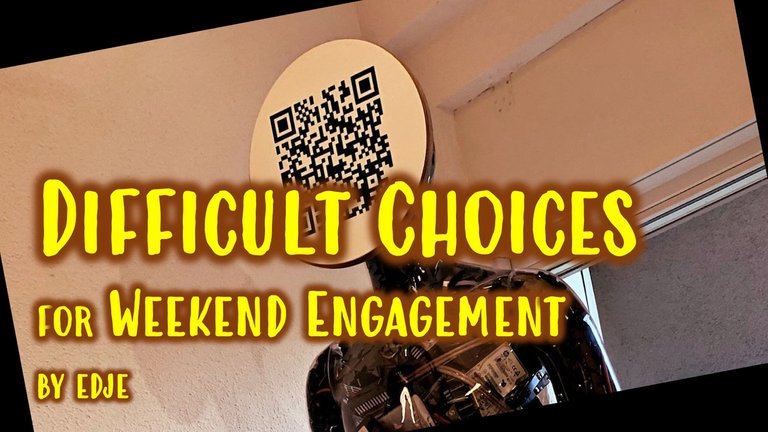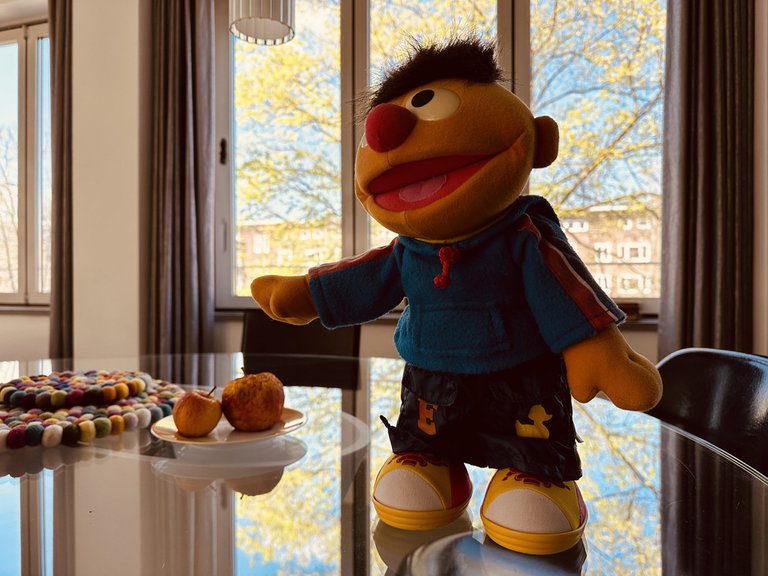Today is the day. The day I write my first ever post based on an official 'prompt'. And you know what? Was darn hard to select a single one. Six prompts are given in this week's Weekend Engagement. All are interesting! How females are portrayed by the media? Not too much different to how they were portrayed in magazines when I was a kid and teenager, like 30 to 40 years ago. Cybercrime? Absolutely we need more security. Cybercrime has just started. Well, it started decades ago already, but what we see today, is still just the beginning. Weekend clothing? Not too much different to my weekday clothing. Working from home in a white-collar job; Not using the video feature too often; Gives me the opportunity to wear anything I like, regardless of how it looks. Sometimes, I handle conference calls with customers, in Adam's costume 😂 Sometimes I make this error with my camera. Usually, it's switched off, but sometimes I have it switched on while not noticing this. Fortunately, this never happened when in Adam's costume 😆 Would be tat too radical for the peeps in the industry I work in. Unattractive features in a woman? Clinching, 100%.
On all topics, I could write book-like posts, but I suppose I shall play by the guidelines and select a single topic out of the six given.
Finally, I decided on 'Job uncertainty, unemployment and diminishing job prospects'.
TLDR: At some point in the future, no job will exist anymore for us living souls we also call humans. That is my firm belief. And no, I am not afraid of this at all. Maybe I am a bit naive, but I truly believe we will be able to transform our financial systems as well as societies in order to deal with such a situation.
I'll explain...
The Ever-Returning Topic
Throughout the last few centuries, I suppose the fear of diminishing jobs is discussed and even feared. Since we entered the first industrial revolution, peeps seem to fear the reduction in the number of jobs, mostly due to automation. First the steam engine. Then electricity. Then factories streamlined for mass production. Then the chip that marked the era of digitisation. Albeit small at the start, the chip went mainstream when we entered the third industrial revolution marked by the focus on IT and the rollout of the Internet. Every time peeps thought: "This will take jobs away." However, every time we've seen the number of jobs increase. Sure, some type of jobs was taken over by automation, but other types of jobs emerged.
Fuzzy Logic: Baby steps towards AI
With the rise of Artificial Intelligence (AI), by now this topic seems to be the talk of the town. Instigated solely by ChatGPT. But don't be fooled. AI is around for a much longer time already. But never seen by the masses. Until the latest version of ChatGPT. ChatGPT is perhaps the first time the general public is given a tool with which they personally can experience the power of AI.
Back in the early 90's when I worked at one of our country's most prestigious research labs, I was involved in the attempt to enhance radar systems in detecting real objects in the air. Back then, stealthy designs were on the rise in the military sector. Something cool for those that created such technology, but something unwanted when the enemy would jump on the same bandwagon. The race was on! Stealthy objects shall not go off the radar! New tech was required. 'Fuzzy Logic' came to the rescue. The first step we made was to apply 'fuzzy logic' to raw radar data to try and enhance object detection in mid-air. And from what I remember, we were kinda successful, albeit we showed just the basics of the basics. Now, you may ask yourself, what the heck is 'fuzzy logic'? Without going into any depth, fuzzy logic is an approach in computation to derive truth and false not in absolute terms, but with certain certainty. Applying statistics to many parameters is at the heart of fuzzy logic. Today's AI algorithms, including ChatGPT, are heavily based on statistics. In fact, the fuzzy logic of back in the days, evolved into AI as we know it today.
Though my years in research was cut short because I decided I needed a more dynamic job environment, my interest in AI never left me. At first, I kept myself somewhat up-to-date by digesting books and other materials going into the mathematical side of things. Later I found myself shifting my interest to the soft sides of AI trying to address questions like: What can AI do for us? Shall we fear AI? How shall we control AI? Can we control AI? ...and more of such questions.

Denial by the Masses
Through the past decades, I had plenty of talks and discussions with peeps around me, family, friends, acquaintances, and even strangers, on the topic of AI. AI and jobs was the topic I usually brought forward in all these conversations.
Though I honestly believe, AI can do so much good for us (later more about this), I am convinced it'll transform our societies drastically. With the transformation from a none AI world into an AI-dominant world, we'll have to deal with a tremendous reduction in jobs. That's (almost) a given for yours truly. Mindboggling though that almost all peeps reacted with: "Edje, that's something claimed every time a new form of automation is applied at large. But the reality shows none of these automation methods ever decreased the number of jobs available. In fact, new jobs were created. Regardless of what technology. The steam engine. Henry Ford's production line. The computer chip. Or even the Internet. Always more jobs after the mass introduction of such innovations. AI will do no different."
As humans, we tend to believe everything will stay the same, at least in our lifetime. But does it? In fact, it so not true. Examples are enough around us. Just 100 years ago the masses got electricity into their own homes in the Western world. Just 50 to 60 years ago, social systems were created to help those that weren't able to create an income for themselves. Just 30 years ago, the mainstream rollout of the Internet. Just 25 years ago, the rise of the mobile phone. Just 20 years ago, the first social media platforms emerged. All these technologies changed our lives tremendously. True, the number of jobs didn't decrease too much though.
AI is Different
Since ChatGPT, the sheer amount of thinkers changing their opinions about Generative AI being possible is increasing dramatically. Plenty of scientists and philosophers weren't too convinced Generative AI is even possible, plenty of them are slowly changing their opinions: from not possible ever, to likely possible in the longer run.
What is Generative AI, you may ask? (read). In short, it is a form of AI that can be taught with text, images, audio and videos and based on such training can create new and unique output. It is essentially the AI form that is needed for AI to be able to design new things and innovate. It is the AI form that has the power to take away ALL our jobs. I mean, literally ALL jobs!
The other day I was listening to this podcast from start to finish with one of the great minds around, Eliezer Yudkowsky (see vid below). Someone who never believed in Generative AI. Someone who is changing his mind. Someone who thinks AI will harm the human race. Maybe he is right, but I like to believe AI will do much good for us. Even when, and maybe because of, AI will take all our jobs away.
Think of it: When we don't have to work anymore, simply because no jobs are available to us, we gain tons of free time! Free time that we can spend the way we want!
Sure, the model we've created in which we humans add value to society by providing our time, body and mind to others in exchange for money; Money that we then use to pay for our lives; That model needs to change dramatically. In fact, that model needs to be replaced by something totally different. But let's assume we find ways to transform, replacing the obligation to give away our time in exchange for money, with a model we can provide for our basic necessities without any obligation.
This will give us pure freedom!
24x7 year in, year out, we can spend our time any way we want! Whatever we need, AI can and will provide for. And rest assured, no humans are needed to keep the AI systems running. AI will maintain itself, as AI will create and innovate. Maybe not today. But I'll be really disappointed when this never happens. It may take a few decades still, or maybe we need till the end of this century. Perhaps even longer. But to me, it's a given AI will handle all the jobs that we know today as well as any job that we will invent in the future. It is just a matter of time before we get there.
Afraid? Not at all!
Funnily enough, I should be very afraid for my own job security. For most of my life am working in the telecoms and IT industry. Next to many of the physically oriented jobs, these industries are likely to be the first affected by AI. Maybe these industries are the earliest affected. While in physical space, for physical jobs, we need robots to replace humans in combination with great AI. In my line of business, we just need clever AI algorithms, no robots are required.
But honestly, am not afraid at all.
Maybe I'm naive! But I feel we will make the necessary transformation as societies, albeit it feels like we are already too late. In the worst-case scenario, I hope my past (and future) investments in companies and projects will provide alternative revenue streams when shit hits the fan. A reason why one of my first large investments (large is relative, but yeah, large in comparison to my own net worth) was in a new type of hotel addressing the younger generations. After the guy who started all this told me he wants to create a chain of hotels, I was in. Regardless of what AI does to us, or perhaps because of what AI will do to us, hotels will be in demand more and more for the simple fact that as a collective we will gain more and more free time. And what will humans do when they gain more free time? Travel!
Transformation
As you may have figured out already, I don't belong to the younger generations anymore. In that respect, I should not be too afraid of what is coming next decades. Closer to my pension age than to my teenage years, I should have already buildup enough security in my financials that I can survive till the end of my Earthly life. Partially this may be true, but not completely yet 🙃 But I have a plan 😉 When none of my investments works out, and I lose my job along the way, I can always try and up my game at HIVE and earn a living in that way. However, this doesn't count for so many youngsters in our society. I am dumbstruck when I talk with many of my colleagues and customers in their 20s and 30s about AI easily taking away most of our jobs, I usually see frowned eyes and rolling eyeballs because many of them think that I am crazy. Same responses as what I was getting last decades when touching on this topic of the power of AI. Perhaps that is the dark side of things. Too few peeps understand the power of AI. Too few peeps able to imagine a world a few decades into the future. The result of this could be: We will not transform our societies and financial systems in such ways that we can deal with mass unemployment. And when that happens, well, I predict the daily hunt and fight for food, a collapse of our financial systems, in fact, 'total chaos'. What will come out of this episode, nobody knows.

A Bright Future Ahead of Us
As mentioned already, I believe we will make the necessary changes, (just) in time. Like almost every big change or evolution we've seen in the past, it'll happen quickly following the tipping point model. The changes we need will also follow this model. When we have to, we will. When we think we have to, we won't. Human nature at its core 🙂
Personally, I'm looking forward to the future! Am so curious to see what lies in front of us. I love to receive the possibility to extend my Earthly existence to at least an extra 100 years. Albeit unknown times, with lots of uncertainties, I really believe we are heading towards a better life for all of us. And it is that belief I like to see in reality. Am I right, or am I wrong? This intrigues me tremendously.


